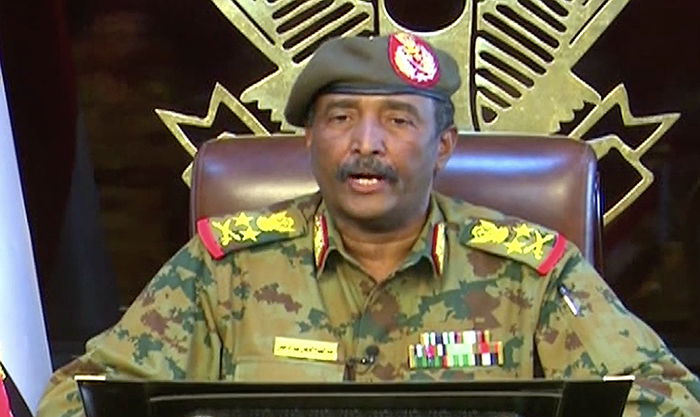Sudan’s military government has told protesters to take down their road blocks in the capital, Khartoum.

Demonstrators have been manning barricades leading to the military HQ, which has been the focus of the protests that helped lead to the ousting of President Omar al-Bashir.
On Sunday, protest leaders said they had ended contact with the military council that removed the president.
They accused it of being composed of “remnants” of Mr Bashir’s regime.
The military says it is committed to handing over power and will consider a joint military-civilian council.
But it insisted that it was responsible for security in the country.
“It can’t continue like this,” said the head of the military council, Lt Gen Abdel Fattah Abdelrahman Burhan.
It was not clear if the protesters would respond to the call.
“We will carry on manning the checkpoints as usual,” 23-year-old demonstrator Kawthar Hasaballah told AFP news agency. “No one, not even the military council, will remove us from our places.”
A mass sit-in outside the military HQ has been taking place since 6 April. Five days later Mr Bashir was overthrown and replaced by a military council that promised it would hand over power to civilians within two years.
Leaders of the protest movement have suspended talks and co-operation with the military. There had been hopes that the talks would lead to civilian rule.
A spokesman, Mohamed al-Amin, called the military council an extension of the old regime and said they no longer recognised it, adding that a civilian administration would be unveiled in the next couple of days.

What now for Sudan’s opposition?
By Fergal Keane, BBC Africa Editor
The crowds are still large and the cheering is still emphatic. But after more than a fortnight of protests the broad front of groups that makes up the Sudanese opposition finds itself confronted with one of the most fundamental quandaries to face a peaceful protest movement: what to do when those you seek to overthrow refuse to accede?
The protest leaders had been expected to announce their candidates for a civilian council to rule Sudan through a transition to full democracy. But last night – after days of expectation – they failed to do that.
This has prompted speculation about divisions as different groups argue about policy and positions. Instead the opposition said it was suspending negotiations with the ruling military council and called for escalating protests.
For now the generals on the ruling military council seem to have regained some cohesion. They have also been given strong backing – including more than $3bn (£2.3bn) in aid – from the Saudis and the United Arab Emirates. There is widespread scepticism among the opposition about any military willingness to hand over power to a civilian-dominated transitional council.

What will the military do?
The military council has said protesters must immediately open the roads to allow for the movement of “essential items”.
It has made such calls before but has not moved to enforce the removal of barricades and checkpoints.
On Sunday it said it would respond to the call for civilian rule within a week, and indicated it might favour a joint council.
It has, however, released political prisoners and on Saturday arrested a number of top members of Mr Bashir’s former ruling party.
How did it all begin?
In December 2018, the government tried to stave off economic collapse by imposing emergency austerity measures and a sharp currency devaluation.
Cuts to bread and fuel subsidies sparked demonstrations in the east over living standards, but the anger soon spread to Khartoum.
The protests quickly widened into demands for the removal of President Bashir, in charge for nearly 30 years, and his government.
The Sudanese military toppled Mr Bashir on 11 April but demonstrators have vowed to stay on the streets until there is a move to civilian rule.
Who are the protesters?
The economic problems brought Sudanese from all walks of life on to the streets but the organisation of demonstrations was taken on by the SPA, a collaboration of doctors, health workers and lawyers.
A large proportion of the protesters have been women and the demonstrators are mostly young. BBC News






